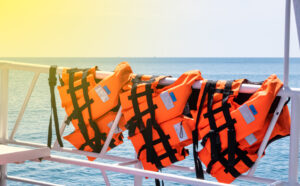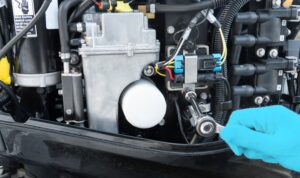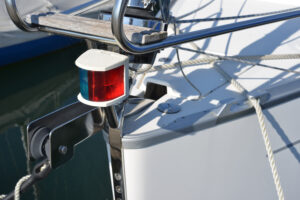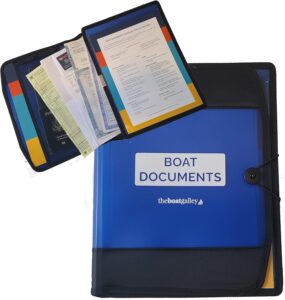How to Prepare for a Safe Boating Season: Essential Tips
Introduction:
After a long winter and rough start to the 2024 boating season, summer is finally here. It is time to ensure your boat is ready for a safe and enjoyable season on the water. Proper preparation can prevent incidents, accidents, and ensure smooth sailing ahead. Here are some essential tips to help you prepare for a safe boating season.
- Inspect Your Boat
- Before hitting the water, thoroughly inspect your boat for any damages or wear and tear. Check the hull, propellers, and any other vital components. Look for cracks, leaks, or any signs of deterioration that might compromise the boat’s safety. Take special care to inspect all thru hull fittings, transducers, hull plugs, navigational lights, batteries, and bilge pumps. Regular inspections can help identify and address issues before they become major problems.
- Although it is not part of the boat itself you should inspect your trailer, if you have one. The trailer inspection is crucial if you want to enjoy your boat, since this is the primary mode of transporting your boat to and from the launch point or the marina the last thing you want is to be sitting on the side of the road when you would be out enjoying the water. Trailer inspections typically include checking the tires, greasing or repacking the hubs, ensuring the brakes are in good repair and functional, ensuring nothing is cracked or missing on the frame, and that all of the lights are working properly.

- Safety Gear
- Ensure your boat is equipped with all required safety gear. This includes life jackets for all passengers (ensure they are the proper rating and in good repair), fire extinguishers (A,B,C,D), flares, a first aid kit, and a sound-producing device like a whistle or horn. Inspect any EPIRB devices, VHF radios, GPS, radar systems, make sure any life rafts and emergency Sat phones are still in working order. Check the condition and expiration dates of these items regularly to ensure they are ready for use and within USCG compliance to be ready in case of an emergency.

- Engine Maintenance
- Regularly service your engine to avoid breakdowns. Change the oil, drive oil, change fuel filters, check the fuel system (lines, tanks, etc), inspect any belts, and ensure the cooling system is functioning correctly, we like to make a habit of flushing the cooling system and replacing the impellers and thermostats each season (especially when used in a saltwater environment). Regular maintenance can prevent many common engine problems and is important in keeping your boat running smoothly throughout the season.

- Weather Checks
- Always check the weather forecast before heading out. Weather conditions can change rapidly, and being aware of the forecast can help you avoid dangerous situations. Use reliable sources and consider having a weather app on your smartphone for real-time updates and remember to keep your eye on the sky. Storms can move fast and with extreme violence, especially in Florida and the Gulf region of the country. Erroring on the side of safety is never a bad thing.

- Emergency Plan
- Have an emergency plan in place and ensure all passengers are aware of it. This plan should include procedures for man-overboard situations, fire, and medical emergencies. Before ever leaving the dock make sure that you tell a responsible party of where you plan to go, what time you plan to go out, and what time you plan to return. Conduct regular drills or quizzes with family and other onboard to ensure everyone knows what to do in case of an emergency, enhancing the safety of all onboard. When at sea everyone is responsible for one another’s safety.

- Lighting
- Even if you don’t plan to be out past dark it is a good idea to make sure all navigation lights are functioning properly. Ensure that any spotlights or other accessory lighting is in good working order to enhance safety. These lights are crucial for safety, especially when boating at night or in low visibility conditions. Check the bulbs and connections regularly to ensure they are in working order and comply with maritime regulations. You should also think about redundancy and carry small handheld flashlights, and other signaling devices to enhance safety onboard.

- Documentation
- Keep all necessary documentation and ensure it is on board and up to date, including registration, insurance, licenses, and any permits. It is a great idea to place these in a waterproof floating container to ensure it is ready if you need it. This ensures that you are compliant with local regulations and can quickly provide information if needed. Proper documentation is essential for a hassle-free boating experience.
By following these tips, you can ensure a safe and enjoyable boating season. Regular inspections, proper safety gear, engine maintenance, weather checks, a solid emergency plan, functional lights, and up-to-date documentation are all essential for smooth sailing. Feel free to contact us or leave a comment on what you do to prepare for a great season on the water.
References:
- BoatUS Foundation – Boating Safety Checklist
- U.S. Coast Guard Boating Safety
- American Boating Association – Pre-Departure Checklist
Smitty
James "Smitty" Smith, founder of Smitty's Haulin', is a U.S. Army Combat Engineer Veteran, retired Maritime SWAT Officer, and Deputy Sheriff from Calvert County, Maryland. His maritime roots run deep, having grown up in Solomons Island, Maryland, where he learned the art of fishing and crabbing from his grandfather, Capt. Henry Batchelor, beginning at the age of five.
Smitty's passion for the water persisted through his teenage years and was further honed by his early work at a local marina. Following his military and law enforcement careers, which included roles in patrol and maritime SWAT, he turned his lifelong love for boats into a business.
After Superstorm Sandy, Smitty's Haulin' Marine Specialized Transport was born, transforming from a hobby into a thriving company. Known for his commitment to excellence and a "no quit" attitude, Smitty has become a recognized leader in the marine transport industry, dedicated to making every client's dream a reality.

